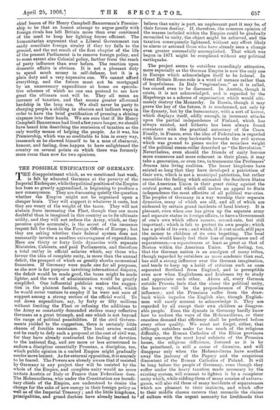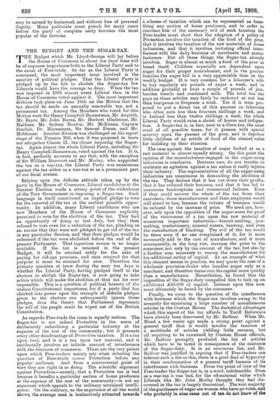THE POSSIBLE UNIFICATION OF GERMANY. T HE disappointment which, as we
mentioned last week, is felt by educated Germans at the poverty of the Imperial Exchequer, while the political position of the Empire has been so greatly aggrandised, is beginning to produce a new consequence. They are discussing quietly the question whether the Empire might not be organised upon a cheaper basis. They will support it whatever it costs, but they are weary of the weight of the taxes. They will not abstain from increasing the Fleet, though they are more doubtful than is imagined in this country as to its ultimate utility, and they will not reduce the Army, which, as they perceive quite accurately, is the secret of the immense respect felt for them in the Foreign Offices of Europe ; but they are asking whether their federal system does not necessarily involve a needless extravagance of expenditure. Here are thirty or forty little dynasties with separate Ministries, Cabinets, and paid Parliaments, and therefore a total outlay in official salaries which, say those who favour the idea of complete unity, is more than the annual deficit, the prospect of which so greatly shocks economical financiers. If Germany were made one for all purposes, as she now is for purposes involving international dispute, the deficit would be made good, the taxes might be made lighter, and the work of administration would be greatly simplified. One influential publicist makes the sugges- tion in the plainest fashion, in a way, indeed, which be would never venture to employ if he were not sure of support among a strong section of the official world. To cut down expenditure, say, by forty or fifty millions without limiting the Fleet or refusing the additions to the Army so constantly demanded strikes many reflective Germans as a great triumph, and one which is not beyond the range of political possibilities. If the civil Govern- ments yielded to the suggestion, there is certainly little chance of forcible resistance. The local armies would not be ready to defy such a proposal at the cost of civil war, for they have already contracted the feeling of devotion to the• national flag, and are more or less accustomed to endure a discipline essentially Prussian, a discipline, too, which public opinion in a united Empire might gradually render more lenient. As for external opposition, it is scarcely to be feared. The Powers are already aware that if resisted by Germany in any project they will be resisted by the whole of the Empire, and complete unity would no more irritate Austria or Italy or France than Federalism does. The Hohenzollerns, who under the Constitution are heredi- tary chiefs of the Empire, are understood to desire the change for the sake of new energy in their foreign policy as well as of the Imperial Treasury ; and the little kingdoms, principalities, and grand duchies have already learned to believe that unity is part, an unpleasant part it may be, of their future destiny. If, therefore, the common opinion of the masses included within the Empire could be gradually reconciled to unity, the object might be achieved, and the taxation consequently lightened, without any effort likely to alarm or astound those who have already seen a change even greater successfully accomplished. That which was begun in 1871 might be completed without any political earthquake.
The project seems to outsiders exceedingly attractive, more especially as the German Empire is now the only one in Europe which acknowledges itself to be federal. In Great Britain Home-rule is a word of menace rather than of hopefulness. In Italy "regionalism," as it is called, has ceased even to be discussed. In Austria, though it exists, it is not acknowledged, and is regarded by the Hapsburgs as a scheme of organisation which would ulti- mately destroy the Monarchy. In Russia, though it may prove the key of the future, it is condemned, not only by the dynasty, but by the bureaucracy, with a sort of horror, which displays itself, oddly enough, in incessant attacks upon the partial independence of Finland, which has always existed, and hitherto has been always found consistent with the practical autocracy of the Czars. Finally, in France, even the idea of Federalism is regarded with horror as a step backwards towards the evil system which was ground to pieces under the resistless weight of the political steam-roller described as "the Revolution." Nevertheless, even should the friends of unity become more numerous and more coherent in their plans, it may take a generation, or even two, to transmute the Professors' dreams into living realities. The lesser kingdoms have existed so long that they have developed a patriotism of their own, which is not a municipal patriotism, but rather resembles the feeling which animated the Southern States of the American Union in their great rising against the central power, and which still makes an appeal to State independence the most effective of all political war-cries. The peoples of Germany in a way worship their separate dynasties, many of which are old, and all of which are endeared by certain grand incidents of local history. It is pleasant, even when one has given up the separate army and separate status in foreign affairs, to have a Government of one's own which offers careers, second-rate, but still important ; which is felt to protect its own people; which has a pride of its own ; and which, if it cost much, still pays the money to children of its own begetting. The local capitals would keenly feel their loss of importance and of separateness,—a separateness at least as great as that of Boston within the American Union. The feeling, too, that the German nation is an amalgam of many tribes, though regarded by outsiders as more academic than real, has still a strong influence over the German imagination, and tends to keep up a habit of criticism such as once separated Scotland from England, and is perceptible even now when Englishmen and Irishmen try to study and appreciate each other. Above all, every German outside Prussia feels that the closer the political unity, the heavier will be the preponderance of Prussian influence ; and the Prussians suffer from the draw. back which impedes the English also, though English- men will rarely consent to acknowledge it. They are regarded by all except their own children as disagree- able people. Even the dynasts in Germany hardly know how to endure the ways of the Holienzollerns, or their ceaseless demand that efficiency shall be preferred before every other quality. We must not forget, either, that although outsiders make far too much of the religious difficulty, the Roman Catholics of the Rhine provinces being amongst the most loyal subjects of the Prussian house, the religious difference, fostered as it is by the priesthood, is still a cause of disunion, and will disappear only when the Hohenzollerns have soothed away the jealousy of the Papacy and the suspicious discontent of the Roman Catholics of Poland. It will be long before the people of Germany, even though they suffer under the heavy taxation made necessary by the existing system, will consent to lighten it by a completer unity which, while ridding them of many sources of extrava- gance, will also rid them of many incidents of separatenesS which are pleasant to their instincts, and which offer to their middle classes careers that reconcile the claims of culture with the urgent necessity for livelihoods that may be earned by brainwork and without loss of personal dignity. Many publicists must preach for many years before the party of complete unity becomes the most popular of the factions.























































 Previous page
Previous page